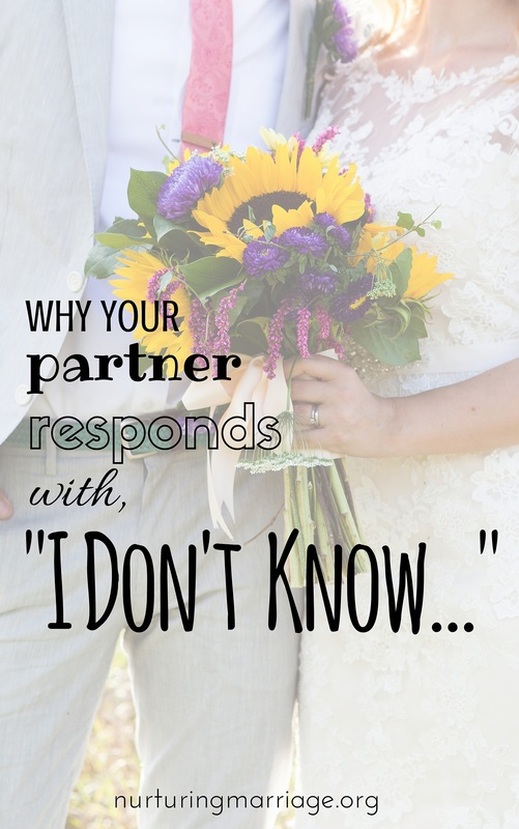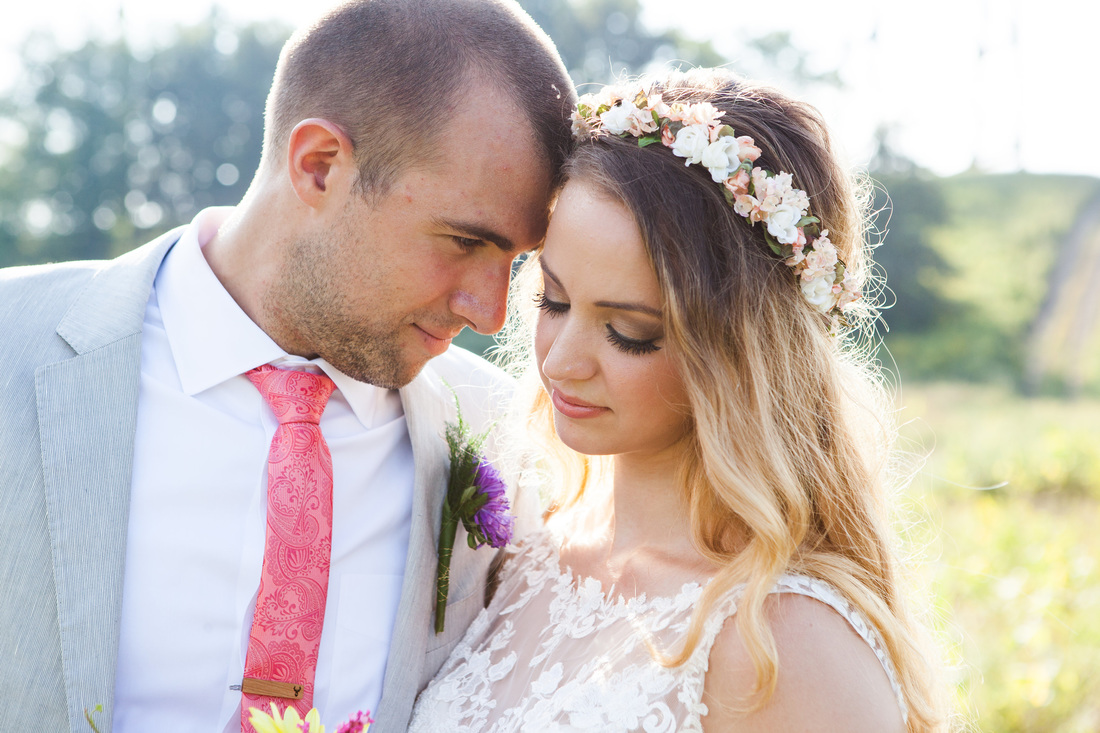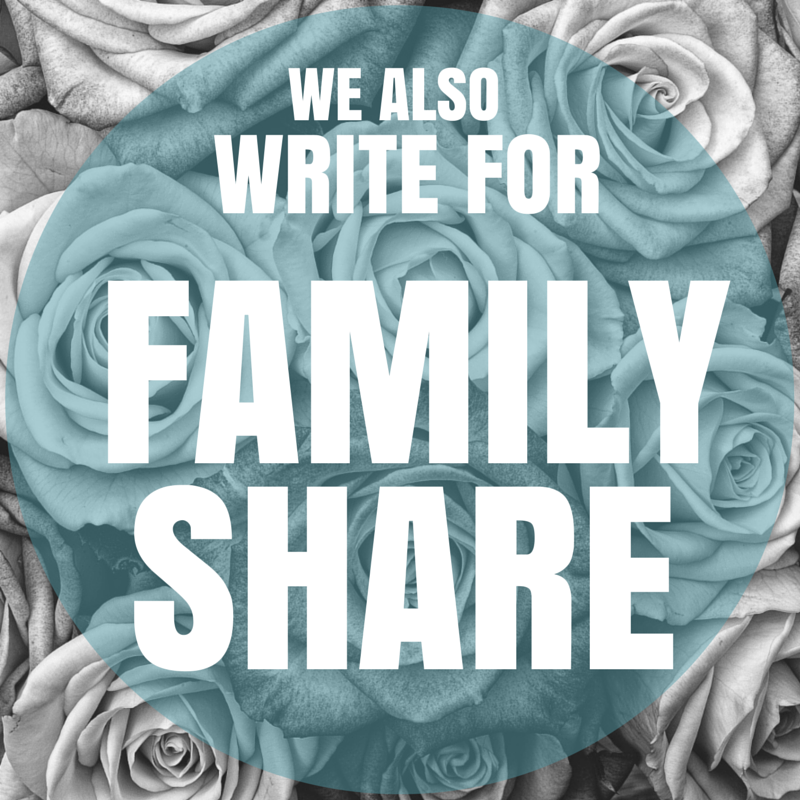|
As a therapist, my least favorite answer to a question is probably “I don’t know…”. I mean I always think (rather critically), Really? You don’t know? Yes, you do. You’re in your head, not me. Just tell me! As I’ve been thinking about this more, I’ve realized that I have the same response to my husband when he gives me non-answers like “Where do you want to go to eat?” “I don’t know, you pick.” “How are you feeling about this?” “I don’t know.” “Did I hurt your feelings?” “I don’t know.” “I just told you how upset I am about all of this, don’t you have any response?” “I don’t know.” I’ve always been frustrated and a little impatient with it, whether it’s in my own marriage or in my relationship with clients in the therapy room, because I don’t understand “not knowing” how you’re feeling. I usually have about a thousand ways to express what I’m thinking and feeling!
Here’s what I didn’t know about “I don’t know,” - it’s true! They don’t know! Earth-shattering, right? But truly, they really don’t know in that moment how to put into words what’s happening for them. Since this was obviously a hard concept for me to accept and understand, I turned to Emotionally Focused Therapy to help explain some of this phenomenon in a way I’d never grasped before. Hopefully it can help you with your partner too, if you’re like me and get frustrated with “non-answers." The types of people who respond with “I don’t know…” or don’t share their feelings very openly are often the people we call “withdrawers,” because in a relationship conflict, they are the ones who leave the room, stonewall, or just go blank. They’re often accused of not being sensitive or caring enough about their partner to check in and engage in the fight. What we see on the outside is these people either passive-aggressively not responding, or shutting down because they just don’t care enough, but what is really happening is their senses are getting flooded and they’re desperately searching for the “right” response to help their partner, it just usually takes longer than the partner has patience to wait for.
This behavior often (not always) starts for these withdrawers when they’re younger. They typically come from the type of family where the best way to get love and comfort from their parents was to be “the golden child," or not make mistakes. They were taught very young that the best way to ensure their happiness and emotional (and physical) safety was to keep the other person happy, because if they made the wrong move, they were punished and lost the loving comfort of their parents. This means that they probably heard phrases when they were little like, “Stop crying!" "You’re driving me crazy!” and “You shouldn’t be overreacting like this!” instead of experiencing comfort when they showed strong emotion. You can imagine why, as adults, these people aren’t sure what to do with their strong emotions–they never learned that it was safe to explore them in a relationship where they were seeking love in return.
With a good therapist in couples therapy, hopefully these partners have the space for the first time to really sit with their overwhelmed senses, take their time to think of how to describe what they’re feeling, and try to respond to their partner without the fear of getting clobbered (verbally) like they usually do. We find that their anxious partners are often surprised and relieved to hear what they have to say (or that they actually have something to say), but wary of trusting it at first. It usually comes as a shock to most couples that one partner gets overwhelmed because they’re scared of saying the wrong thing again and hurting their partner further. This is very different from the narrative that the partner just has no emotional intelligence or “doesn’t have the capacity to feel.” With practice and patience, though, couples can start creating more safety for ALL types of responses, so the withdrawn partner feels like they can explore their feelings without fear of “getting it wrong," which helps the more anxious partner relax because they can more clearly see their partner trying to engage with them. Are you usually the partner responding with “I don’t know”? Or are you the partner desperate to hear from your withdrawn partner? Take the RELATE Assessment together as a couple today to open up the conversation about your communication and connection!
Photo Credit: Caitlinn Mahar-Daniels
5 Comments
Stacia
8/21/2015 01:53:29 am
You guys always do a great job on your articles! I grew up in a house like what was described, where love felt conditional based on whether or not you were obedient. I totally relate to this. What is the RELATE Assessment she mentioned?
Reply
Aaron & April
8/21/2015 07:49:45 am
Thanks, Stacia! The RELATE assessment is a comprehensive survey developed by academics that individuals or couples can take to learn more about their personal strengths and areas for improvements in a relationship.
Reply
Chole Alopia
2/12/2024 03:31:38 am
I promise Dr Kala that I will testify of his good work if he helps me to get back my husband and he really did, my husband came back to me and begged me to forgive him for the pains he has caused me. My husband and i have been together for 11yrs and married over 6years now with 2 kids, my husband started going out with other ladies and showed me cold love, on several occasions he threatens to divorce me if I dare question him about his affair with other ladies, I was totally devastated and confused until a friend of mine told me about a spell caster called Dr Kala who help people with relationship and marriage problems by the powers of love spells, at first I doubted if such thing ever exists but decided to give it a try, when I contact him, he cast a love spell for me and within 48hours my husband came back to me and beg me to forgive him for what he did to me and right now he has stopped going out with ladies and he is with me for good and for real. Contact this great spell caster for your relationship or marriage problem on email: kalalovespell@gmail.com or WhatsApp +2347051705853
Reply
THIS IS HOW YOU CAN RECOVER YOUR LOST CRYPTO? Are you a victim of Investment, BTC, Forex, NFT, Credit card, etc Scam? Do you want to investigate a cheating spouse? Do you desire credit repair (all bureaus)? Contact Hacker Steve (Funds Recovery agent) asap to get started. He specializes in all cases of ethical hacking, cryptocurrency, fake investment schemes, recovery scam, credit repair, stolen account, etc. Stay safe out there!
Reply
Leave a Reply. |
Studies Show“Remember that a successful marriage depends on two things: (1) finding the right person and (2) being the right person.”
- Carrie Snow You Know You Want to ReadEverybody Loves These |




